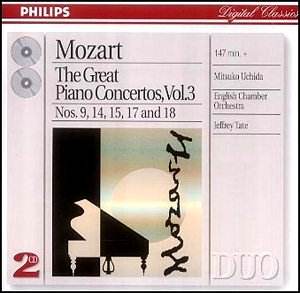This twofer is Volume 3 in Mitsuko Uchida / Jeffery Tate’s
re-release of part of their complete cycle of the Mozart Piano Concerti.
Volumes 1 and 2 containing the later, perhaps more popular concerti have
already been issued to high acclaim. This most recent issue contains more
relatively unfamiliar works, but is no less enjoyable for that.
Anyone who has been collecting these twofers will know
what to expect: modern, very truthful recordings of one of the pre-eminent
Mozart pianists of the day, beautifully accompanied by an orchestra
steeped in the playing of the Master, directed by a Mozart expert. Could
we wish for anything better – probably not.
The competition is severe, and the only performers
of these works, which I might put in front of these recordings, are
those of Murray Perahia, but as far as I am aware these are available
only as a complete set or as single discs. Cost-wise therefore the Philips
discs have the competitive edge and the performances will give just
as much pleasure.
If indeed you are keen on buying the favourite Piano
Concerti of Mozart, for the price of three full price CDs you can get
them all, with the earlier Rondo thrown in as a bonus.
The first on this set is the Jeunehomme Concerto
which is reckoned to be the first of Mozart’s mature piano concerti.
Only two or more years before this work, Mozart had completed his violin
concerti, No.1 in 1773, and the remaining 4 in 1775. What a difference
two years make to the young composer. The opening orchestral tutti with
the participation of the piano from the second bar is much more assured
and is arresting in a way that none of the Violin Concerti could ever
be. Here the partnership between conductor and soloist is magical, and
the very clear recording picks up every nuance. The name of the Concerto
by the way, comes from the dedication – the original performer was a
Mlle Jeunehomme.
After this initial concerto, we move on to the series
of mature early concerti, all of which I enjoy greatly and would be
hard pressed to choose the best. Encouraged by the success of the early
works, Mozart embarked on creating the series of concerti from No. 14
to No. 27, with the quality of work increasing as time progressed. Mitsuko
Uchida clearly has the full command of these works and her interpretations
have only one possible shortcoming compared with Murray Perahia on Sony.
This is a sense of reticence in her playing compared with her American
competitor. I do not see this as a shortcoming, as these masterpieces
are sufficiently robust to be played in either fashion. A superb set.
John Phillips
